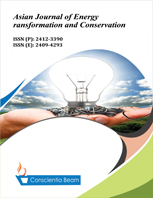Energy Education as a Necessary Condition to Transition to a Robust Future Energy Security in Suriname
DOI:
https://doi.org/10.18488/journal.81/2014.1.1/81.1.1.18Abstract
There is significant uncertainty when it concerns future energy security. One way to deal with this is the so-called Scenario Planning methodology. Energy scenarios for Suriname have been made which indicate that climate change will have the greatest impact on the energy sector, thereby threatening energy security. The exact nature of this impact is however too uncertain to determine. To overcome this uncertainty there is a growing consensus with respect to the main ingredients for a sustainable energy system that can deal with this uncertain impact. However, current developments stray away from this system and rather lock Suriname in centralized, large-scale thermal and hydro power systems. The reasons behind this must be found in the Government’s lack of capacity of making energy policy and the influence of public companies, EBS and the State Oil Company, who are heavily vested into the existing energy system. It is therefore of paramount importance to address and intensify education in the field of energy engineering, policy, scenarios, networks, strategy, etc. This impacts the likelihood of transition pathways actually occurring. This notion might be applicable to other (small) (developing) countries, and adds to the growing literature on the difference in transitions across geographical regions.

